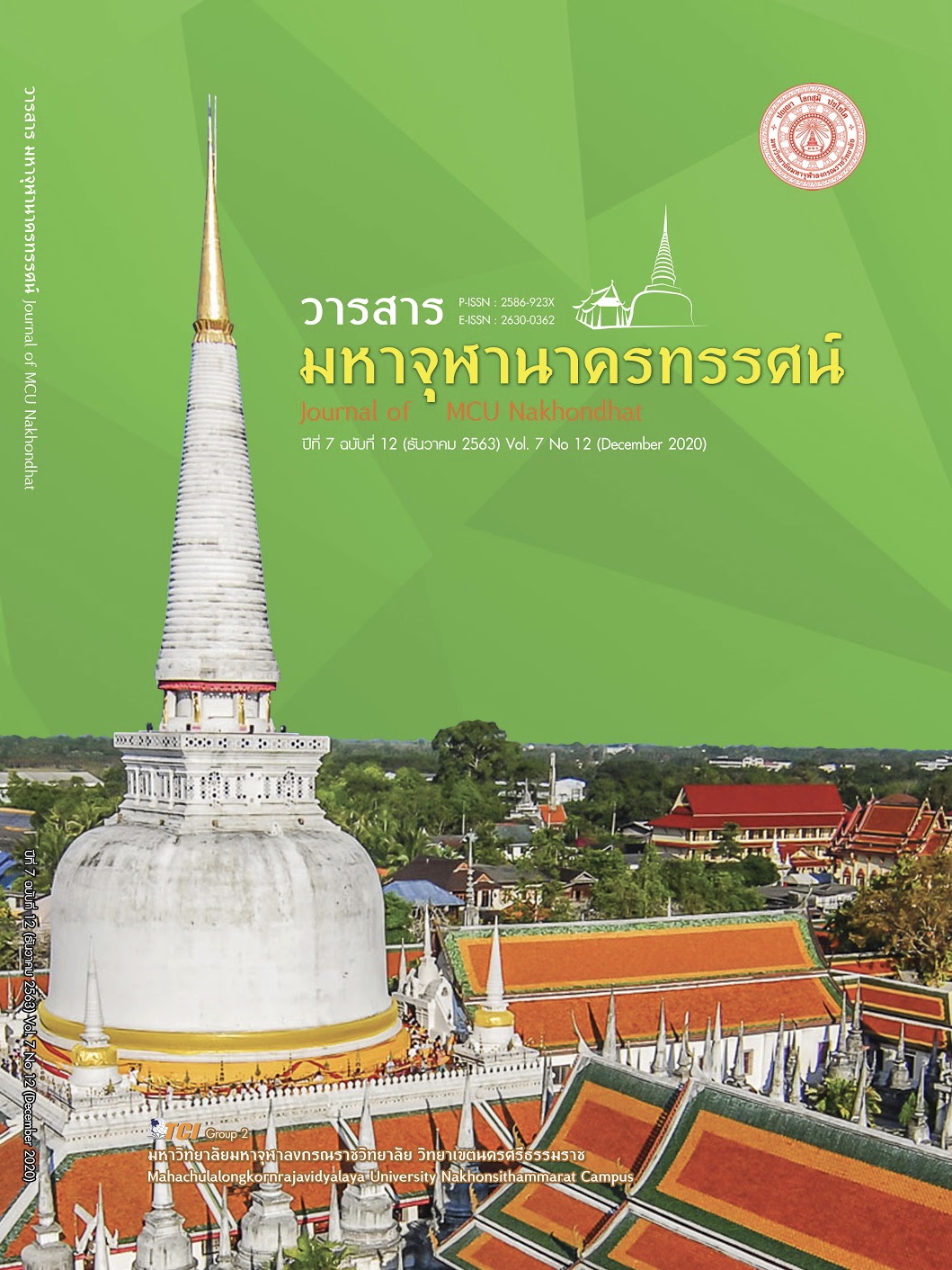THE RELATIONSHIP BETWEEN SELF – ESTEEM AND QUALITY OF LIFE IN ELDERLY WITH NON – COMMUNICABLE DISEASES
Main Article Content
Abstract
The objectives of this research was to study the relationship between self - esteem and quality of life of the elderly with chronic non - communicable diseases: NCDs. The samples consisted of 517 elderly aged 60 years and over with NCDs (hypertension, diabetes, cardiovascular, Cholesterol), which calculated using G* power program and using multistage sampling. The research instruments were 1) the self - esteem scale that developed by researcher from the concept of Rosenberg Self - Esteem scale and 2) quality of life assessment that developed by researcher from the concept of quality of life of the World Health Organization and WHOQOL - OLD questionnaire. The content validity of research instruments were .82 and .80, reliability using Cronbach's alpha coefficient were 0.71 and .88 respectively. The data were analyzed by frequency, percentage, mean, standard deviation and the Pearson correlation coefficient. The results revealed that 1) the overall self - esteem of the elderly with NCDs was high ( = 3.10, S.D. = .41) 2) the overall quality of life of the elderly was at a good level (
= 109.58, SD = 9.38) and 3) self - esteem had a moderately positive correlation with overall quality of life (r = .549) at .01 level, self - esteem had a low - moderate positive correlation with quality of life on each aspect (r = .414 - .649) at .01 level, but self - esteem had a few negative correlation with quality of life in the face of death (r = .281) at .01 level and had no relationship with physical quality of life.
Article Details
References
งานเทคโนสารสนเทศ สำนักงานสาธารณสุขจังหวัดนครศรีธรรมราช. (2561). สถิติผู้ป่วยโรคไม่ติดต่อเรื้อรัง. นครศรีธรรมราช: สำนักงานสาธารณสุขจังหวัดนครศรีธรรมราช.
ชุติมา สินชัยวณิชกุล และจิราพร เกศพิชญวัฒนา. (2561). ปัจจัยที่มีความสัมพันธ์ต่อการสูงวัยอย่างมีสุขภาวะ ของผู้สูงอายุในชุมชนเขตกรุงเทพมหานคร. วารสารพยาบาลทหารบก, 19(ฉบับพิเศษ), 100-109.
ทัศนีย์ กาศทิพย์ และคณะ. (2562). ภาวะสุขภาพของผู้สูงอายุที่มีภาวะบกพร่องเล็กน้อย. วารสารสภาการพยาบาล, 34(1), 104-121.
ประเสริฐ อัสสันตชัย. (2552). ปัญหาสุขภาพที่พบบ่อยในผู้สูงอายุและการป้องกัน. กรุงเทพมหานคร: ยูเนี่ยน คริเอชั่น.
ปรางทิพย์ ภักดีคีรีไพลวัลย์. (2559). การศึกษาคุณชีวิตของคนในชุมชนบ้านแสนตอ หมู่ 11 ตำบลท่าผา อำเภอเกาะคา จังหวัดลำปาง. ใน สารนิพนธ์สังคมสงเคราะห์ศาสตรมหาบัณฑิต สาขาการบริหารและนโยบายสวัสดิการ. มหาลัยวิทยาลัยธรรมศาสตร์.
อุทุมพร ศรีเขื่อนแก้ว และคณะ. (2561). ความสัมพันธ์ระหว่างความสุข ความรอบรู้ด้านสุขภาพและคุณภาพชีวิตของผู้สูงอายุ: กรณีศึกษาผู้สูงอายุในโรงเรียนผู้สูงอายตำบลเวียง อำเภอฝาง จังหวัดเชียงใหม่. MFU Connexion, 7(2), 76 - 95.
Bozorgpour, F. & Salimi, A. (2012). State Self - esteem, Loneliness and Life Satisfaction. Procedia - Social and Behavioral Sciences, 69, 2004-2008. Retrieved September 25, 2020, from http://dx.doi.org/10.1016/j. sbspro.2012.12.157
Diener, E. et al. (1985). The Satisfaction with Life Scale. Journal of Personality Assessment, 49(1), 71-75.
Greenberg, J. et al. (1986). The Causes and Consequences of a Need for Self - esteem: A Terror Management Theory. In R. F. Baumeister (Ed.), Public Self and Private Self (pp. 189-212). New York: Springer - Verlag.
Greenberg, J. et al. (1992). Why Do People Need Self - Esteem? Converging Evidence that Self - Esteem Serves as an Anxiety - Buffering Function. Journal of Personality and Social Psychology, 63(6), 913-922.
Hinkle, D. E. (1998). Applied Statistics for the Behavior Sciences. (4th ed.). New York: Houghton Mifflin.
Jang, J. et al. (2014). Predictors of Suicidal Ideation in a Community Sample: Roles of Anger, Self - Esteem, and Depression. Psychiatry Research, 216(1), 74-81.
Li, C. et al. (2015). Social Support Buffers the Effect of Self - Esteem on Quality of Life of Early - Stage Cervical Cancer Survivors in Taiwan. European Journal of Oncology Nursing, 19(5), 486-494.
Mann, M. et al. (2004). Self–Esteem in a Broad - Spectrum Approach for Mental Health Promotion. Health Education Research: Theory & Practics, 19(4), 357-372.
Ogihara, Y. (2019). A Decline in Self - Esteem in Adults over 50 is not Found in Japan: Age Differences in Self - Esteem from Young Adulthood to Old Age. Retrieved September 10, 2020, from https://doi.org/10.1186/s13104-019-4289-x
Orth, U. & Robins, R. W. (2013). Understanding the Link between Low Self - Esteem and Depression. Current Directions in Psychological Science, 22(6), 455-460.
Pyszczynski, T. et al. (2004). Why Do People Need Self - Esteem? A Theoretical and Empirical Review. Psychological Bulletin, 130(3), 435-468.
Robins, R. W & Trzesniewski, K. H. (2005). Self - Esteem Development Across the Lifespan. Current Directions in Psychological Science, 14(3), 158-162.
Tavares, D. et al. (2016). Quality of Life and Self - Esteem among the Elderly in the Community. Ciência & Saúde Coletiva, 21(11), 3557-3564.
World Health Organization. (2015). World Report on Ageing and Health. Retrieved September 25, 2020, from https://apps.who.int/iris/bitstream/handle/ 10665/186463/9789240694811_eng.pdf


